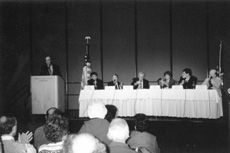The possibility of war on Iraq is slowly starting to look real and, like in 1991, the focus is once again on Saddam’s weapons capability. That, among other related issues, was the subject of a recent panel discussion at the JFK Library. Held as part of a series of forums to commemorate the 40th anniversary of the Cuban missile crisis, the talk brought together several experts closely connected to the issue, including former chief UN weapons in Iraq, Scott Ritter. He fired the opening salvo, asserting that “the administration is building its case on just perceived threats. I do not see a threat, certainly not one worth sacrificing American lives.”
Threat or no threat, some argue that Iraq has a sorry human rights record, and that alone warrants U.S. intervention. Stephen Van Evera, professor of international relations at MIT, points out that Saddam is reported to have killed around 400,000 people in a country of about 20 million. But if human rights violations make a case for war, then North Korea, Saudi Arabia and Pakistan are also serious contenders. North Korea has an aggressive missile program and it recently went nuclear, too. Reports suggest Pakistan could implode as a state, and there is real danger of Islamic extremists getting their hands on nukes. Saudi Arabia not only has a dismal human rights record, “madrasas” funded by it in Pakistan serve as assembly lines for the Taliban and al-Qaeda. Evera agrees these issues will have to be dealt with in the near future, but says the biggest threat at the moment is from al-Qaeda. Two thirds of its leadership is reportedly intact and ninety percent of the “jehadists” are still on the loose.
In recent months, the Bush administration has drawn much resentment from UN members for its unilateral approach on Iraq. Gillian Martin Sorenson, Assistant Secretary General for External Relations at the UN, cautions on the enormous risk of waging war on Iraq, and instead calls for inspections. She admits that though war might be inevitable, it should be a last resort and that, too, after inspections have failed. “Our real concern,” she adds, “are unintended problems, like stability of the region, the leadership issue in Iraq after the war and Muslim backlash against the US. And I don’t see anyone talking about these issues.”
But not everybody agrees with Sorenson. Mickey Edwards, lecturer in legislative politics at Harvard, calls it an offense “to know of a threat to America and not act upon it. Many Democrats and Republicans agree on Iraq’s weapons capability and so surely a case has been made.” And what about the war plans being called an “election stunt” and “unfinished family business”? Edwards dismisses them as “cynical views that cast aspersions on the Congress and the President.”
Considering Saddam’s notoriety and widespread opposition to war against Iraq, some wonder if he could just be tamed. MIT’s Evera says that though the containment policy is working, it is beginning to come apart. That is because some nations, like France and Russia, have no qualms about doing business with Saddam. But the nuclear embargo is still strong and Saddam cannot go nuclear until the embargo stays. At least that is what the British assess. As sanctions slowly start easing and Saddam’s purchasing power increases, it builds tension in Israel. Raviv Drucker, diplomatic correspondent for Israeli Defense Forces Radio, feels Iraq has the potential to join the N-club in the next couple of years. Interestingly, Drucker admitted to an Israeli nuclear arsenal of about 200 warheads and said it can “vaporize any threat” even in the absence of a coalition.
One of the main arguments used by the anti-war protesters is that an Iraq war will lead to heavy casualties. However, that was said even during Afghanistan and it didn’t happen. Can the same feat be repeated in Iraq? Evera dismisses the myth of victory in Afghanistan, saying it actually ended up destabilizing that country. “Instead of one group, the Taliban, in control, you now have scores of warlords. The previous regime has been removed, but at what cost? There may be normalcy in Kabul, but elsewhere in the country life is still the same.” The CIA is reportedly helping grow poppy because that is the only cash crop known to the locals.
With cries for inspections reaching a crescendo, pro-war supporters dismiss them Saddam ploy to buy time. After all, Saddam did play cat and mouse games with the United Nations Special Commission (UNSCOM) for six long years. Ritter headed that body until he abruptly resigned in 1998, alleging U.S. interference in the inspection process. Ritter admits that inspections this time cannot work without Iraq’s cooperation. More importantly, the U.S. has to maintain the integrity of the inspections. He recalled that during an earlier inspection in 1996, the CIA had planted spies within a UNSCOM group assigned to inspect Iraqi presidential buildings. Ritter says Iraq may have weapons of mass destruction, but that only makes the case stronger for inspections, not war. “But I think a decision on war has already been made,” he added.
As the discussion neared an end, Sorenson summed up the talk by contrasting the Bush presidency with that of Kennedy’s. “During the Cuban missile crisis, Kennedy kept open a variety of options in his relentless quest to avert war. During this presidency, war seems to be the first, and only, choice.”





















































